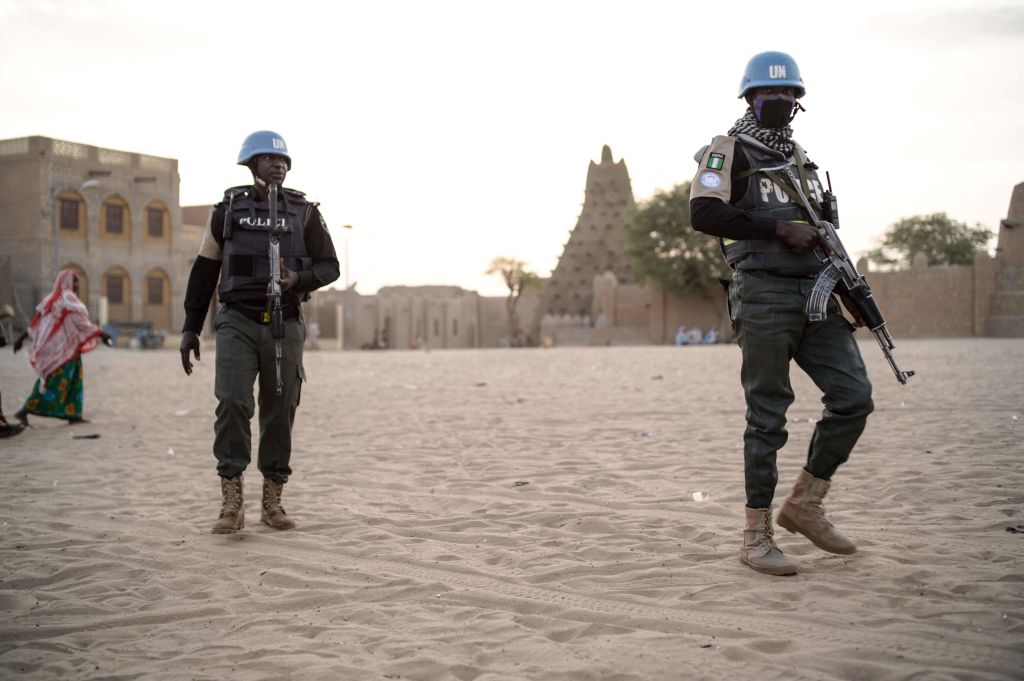ADF STAFF
Faced with unrelenting extremist violence and a hostile host government, the United Nations mission in Mali (MINUSMA) announced it will end its mission by the end of the year.
In a unanimous vote on June 30, the U.N. Security Council moved to begin the withdrawal of the U.N.’s 15,000-person mission immediately and transfer its tasks to the Malian transitional government by December 31. The move follows a request in June by Malian Foreign Minister Abdoulaye Diop for U.N. peacekeepers to leave the country.
The announcement was met with concern by observers who fear worsening conditions in the country where violence is a near-daily occurrence and nearly 1,700 people have died this year as a result of attacks by terrorists, security forces or other armed groups. Human Rights Watch called the withdrawal a “serious blow to the future of human rights monitoring and protection of civilians in the conflict-torn region.”
Julie Gregory of the Stimson Center, a foreign policy think tank, said the end of the mission could be a green light for increased attacks by extremists.
“It’s likely that violent extremists will take the opportunity to increase violence with a potential for increased confrontation with national forces, especially in the north,” Gregory told France 24.
Some experts said the U.N. was faced with two bad options.
“If you leave, you have anarchy and civil war, especially against civilians and the weak. If you stay, you are almost discredited,” Ahmedou Ould-Abdallah, a former Mauritanian foreign minister who served as a top U.N. official in West Africa, told Voice of America.
Whatever happens in Mali echoes across West Africa. Violent extremists have been on the attack for more than a decade in the country, expanding into neighboring countries such as Burkina Faso and Niger. In recent years, the extremists have made no secret of their desire to expand into coastal nations to the south, such as Benin, Côte d’Ivoire, Ghana and Senegal.
The U.N. launched MINUSMA in 2013 after separatist rebels and al-Qaida-linked extremists took control of the northern part of the country. More than 170 peacekeepers have died in the fighting, making MINUSMA the U.N.’s most dangerous ongoing combat mission.
France launched its own military operation in Mali in 2013, aimed at preventing a takeover by extremists, but pulled its forces out last year. Germany has announced it will pull its 1,100 troops out of MINUSMA and has pledged to provide civilian assistance.
Mali’s current military government has allied itself with Russia and its Wagner Group mercenaries. About September 2020, Mali’s government agreed to accept 1,000 Wagner Group personnel “to conduct training, close protection, and counterterrorism operations,” according to the Foreign Policy Research Institute.
A coalition of armed groups in the country, the Permanent Strategic Framework for Peace, Security and Development, has been at odds with the military government and pulled out of peace talks in December 2022. The coalition has said it will return to negotiations only in a neutral country and under international mediation, according to Al-Jazeera.
Ould Mohamed Ramdane, speaking for one rebel group, told Reuters that MINUSMA was the key to the continuation of the negotiations. He said in addition to its role in the peace talks, MINUSMA had brought “calm and security” to areas where it was deployed and had dispensed humanitarian aid in northern Mali.
The Brussels-based Egmont Institute has reported that there is “no doubt” that MINUSMA peacekeepers have managed to reduce violence against civilians during the past decade, although to varying degrees over different periods. The institute also noted that “it often goes unreported that it is the government of Mali which has the primary responsibility to protect civilians on its territory.”
MIMUSMA’s mission never has been simple. Most recently, it has had to work with military leaders from coups in August 2020 and May 2021. Guterres has acknowledged uneven results from MINUSMA but has pointed to the importance of the coming year, with the junta promising a return to civilian rule. That promise has been widely viewed with skepticism.
Mali’s military leaders have come under increased condemnation since the U.N. released a report in May that blamed foreign fighters, allegedly members of the Wagner Group, for the massacre of at least 500 people in the town of Moura in March 2022 in what was supposedly an anti-terrorist operation.
Security experts, according to the Egmont Institute, said the MINUSMA withdrawal at the demand of a military junta sets a dangerous precedent encouraging leaders “to dictate if, when, and how U.N. operations should withdraw.”

